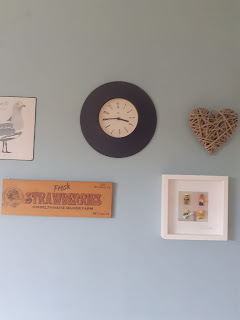So, back to the Alphabet of Authors. Inspired by my Heather-Boss who last year read those 52 books in 52 weeks, and has the list to prove it, I thought that 26 would better my chances of success. A fortnight per book, and has the novelty of matching the alphabet. So far so mostly good!
Most of January was taken up with Sense and Sensibility, made more poignant by the fact that
But on, to the new-to-me Saul Bellow and Him with his Foot in his Mouth. Get it now! Read it now! I only found it because before Christmas a friend asked me to read The Day the Machine Stopped by E. M. Forster. So, I did, and realised that here was the short story I'd read a teenager in a science-fiction collection that I hadn't kept because I don't like science-fiction, the disposal of which I subsequently and deeply regretted because I could never after find this story which is arguably the most frightening depiction of what is becoming us in this virtual social sphere in which we sit at keyboards. However, as I was ordering the little book on Amazon, said book-seller recommended Saul Bellow's book, and he began with B.
Fabulous. Hilarious, sad, recognisable, wholly alien. It was everything. I loved it. I suppose it most reminded me of Gilead, in that here you meet an old gentleman looking back over his life, it achievements and perceived failures, but this time with great pathos. It is a little gem of a book. I wanted to start right back at the beginning as soon as I got to the end!
In February I looked along the bookshelves and found a book by Chris Cleave that had been a Christmas present a while ago and that I thought I hadn't read. I was wrong. With every page enough was familiar to convince me that I had read it already, but not enough was familiar for me to know what would happen next. It was like watching Agatha Christie films at Christmas. The Other Hand is a moving account of life as a refugee, of the horrendously corrupt systems that throw them from their countries, and is a topical read as our world descends into migratory hell. The development of the flawed narrators is cleverly done. Cleave manipulates his reader well. I didn't want to start right back at the beginning though; I wanted this time to remember that I had read it at all.
The Language of Flowers is a narrative. My favourite sections of the book were definitely those where the discussion of the flowers' symbolism was paramount. The idea of a relationship built on communication through flowers was wonderful. At times though I did find the protagonist dubious. I work with some very troubled children, and while I would love to think that one day some deus ex machina will make it all go away, I'm not so sure. I did like the portrayal of early post-partum life with a baby. I was nonetheless happy to be at the end and be done.
This month has been all about the Prague Cemetery. Oh my goodness. Now, know that I love The Name of the Rose and have read it many times. Yes, I liked the film too. However I tried, and failed, three times to read The Island of the Day Before. This should have confirmed to me my colleague's warning that PC is a hard read. But Umberto Eco is an E, and on I went. I finished it this evening. I did not read every single word. I skimmed whole passages. Reader, I skimmed whole pages. I was upset that now Eco had died while I was reading. If you want an epic read where the fictional main character takes part in real and devastating world events, read Louis de Bernieres. His mandolin-playing army officer and young friends with bird whistles will become beloved figures over whom you will happily sob in the last ten chapters. If you want a main character who will play an active if incredible role in every world event during his lifetime, read The One Hundred Year Old Man Who Climbed Out the Window and Disappeared. You will laugh heartily, freely suspend your disbelief and savour every outrageous word. If you want a disturbing history with pre-Holocaust references, steel yourself for The Book of Samson by David Maine. Uncomfortable, bloody, and consuming. If you really must fill your head with conspiracy theory read The Men who Stare at Goats by Jon Ronson. It is ridiculous enough to be believable, and sadly so.
If you want Umberto Eco, be cleverer far than me or stick with the accessible Name of the Rose. If Prague Cemetery explains how the Holocaust could happen, it does so with no sympathy. If it presents an allegory of how our religious suspicion becomes persecution at every strata of society, it loses itself too often in perniciously detailed historical pedantry. If it condemns governments and their hypocrisy, it exhausts the reader to the point of apathy. Did I want to start right back at the beginning as soon as I got to the end? No.
And my F? No idea. Jane Brocket cites The Home-Maker by Jane Canfield Fisher as an inspiration. As a former librarian I am aware that this would not be shelved under F, but it may just be a much needed antidote to E.




